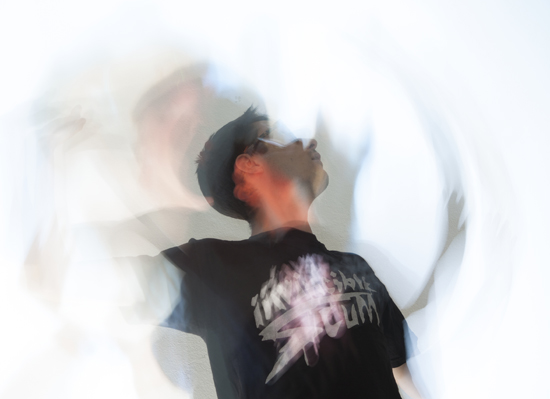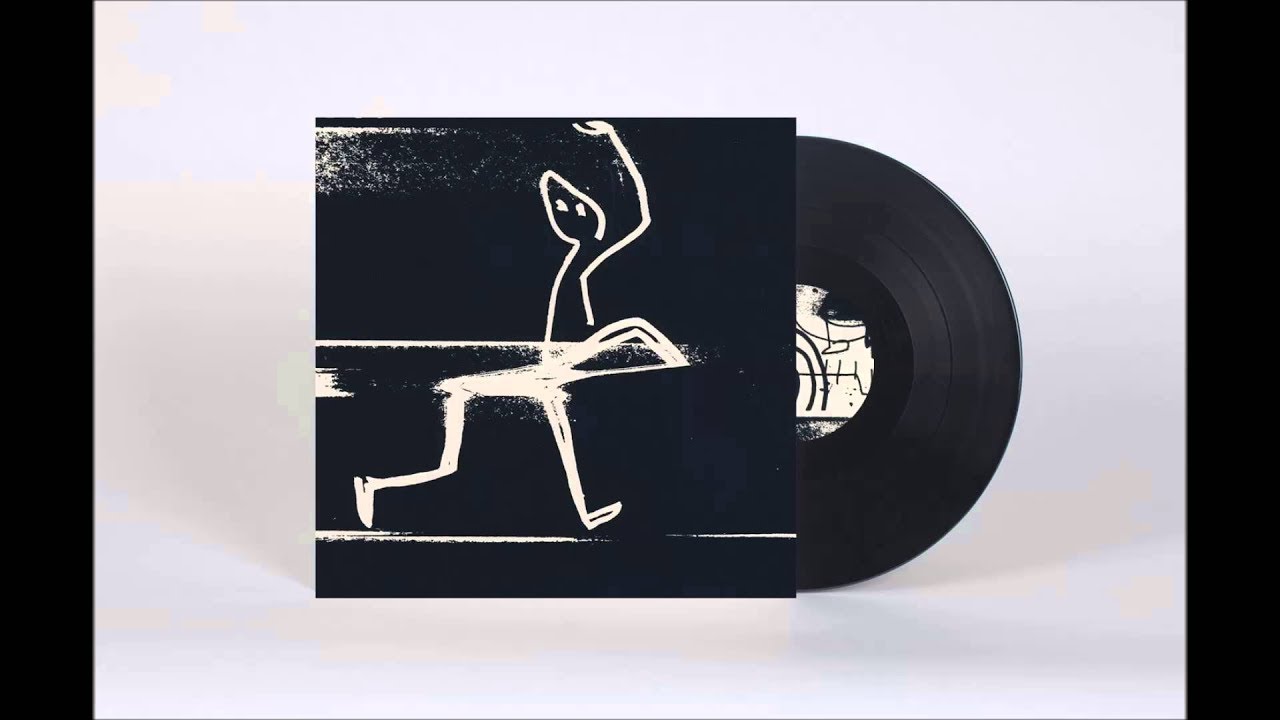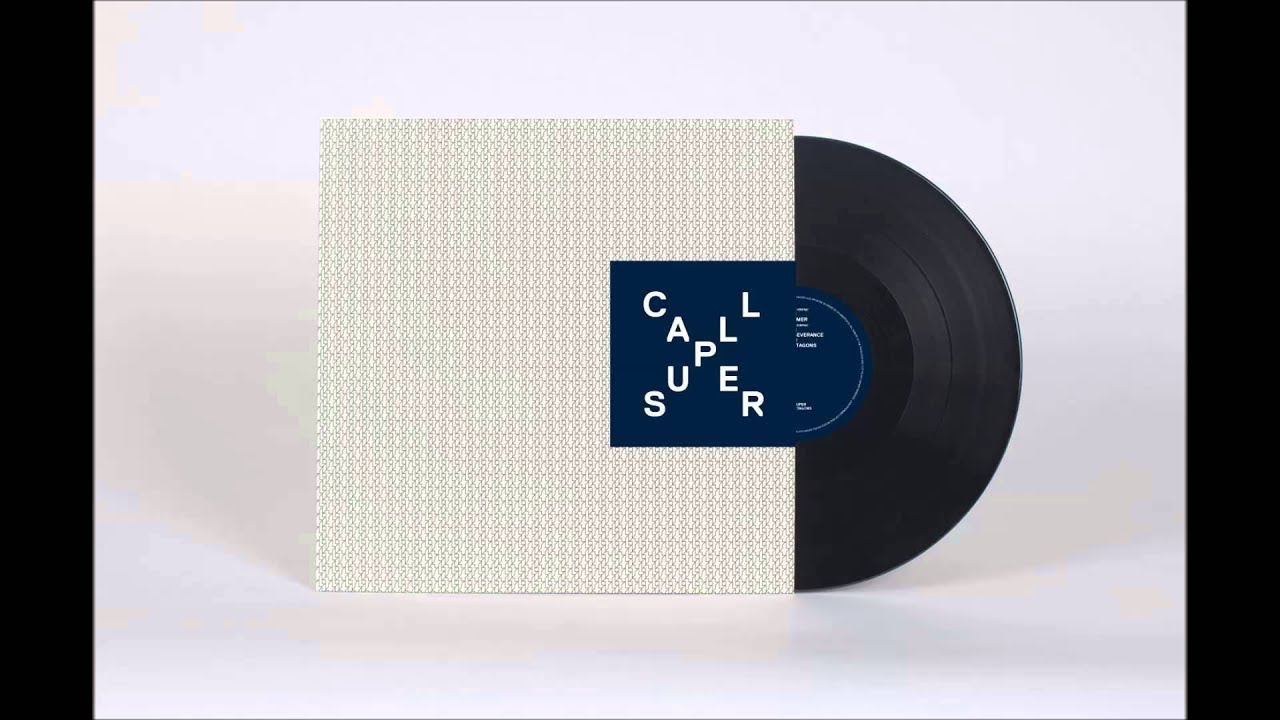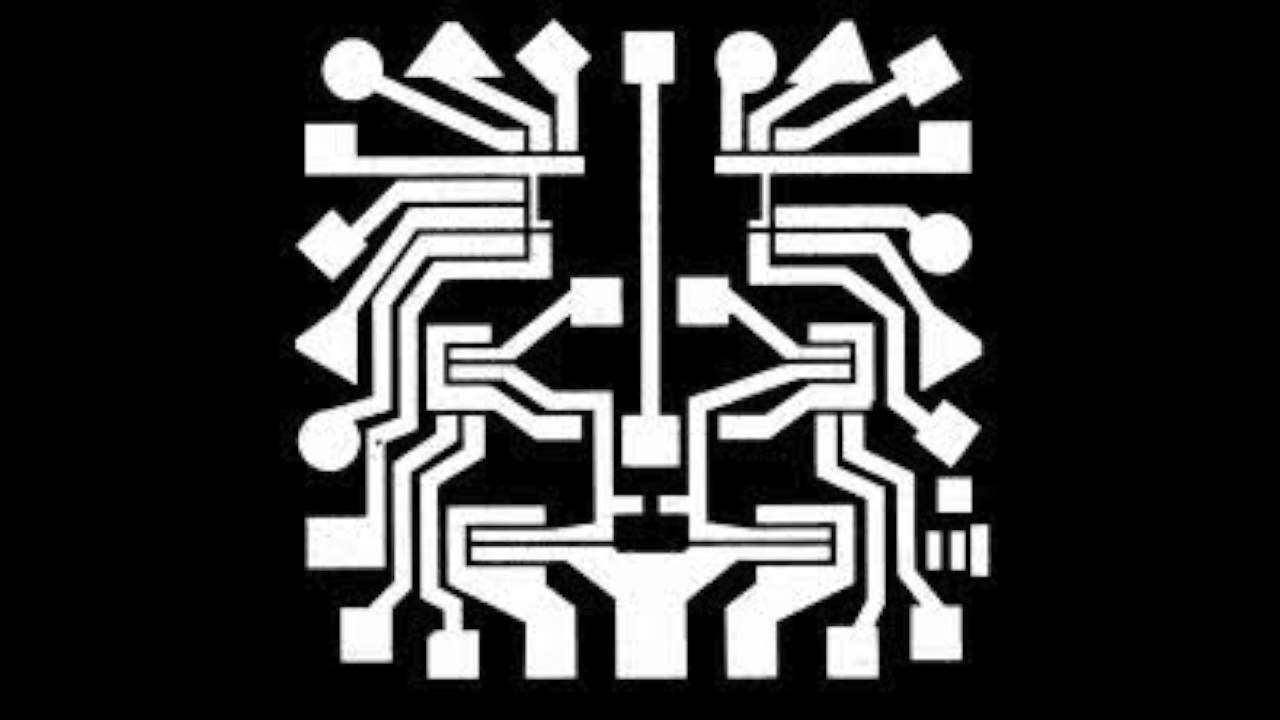"Curiosity is the real fibre that keeps you going every day," says Joseph Seaton, sitting in a central London pub on a blazing hot midsummer’s afternoon. "So keep your curiosity wide and you’ll be alright."
‘Curiosity’ is a word that crops up a few times in conversation with the North London-raised, Berlin-based artist, while he’s discussing the ideas and impulses channeled into his debut album as Call Super, Suzi Ecto. Another is ‘paranoia’, a characteristic I’d not previously noticed in his tactile, harmonically rich takes on techno, but which looking back has been a darker presence lurking throughout his stellar run of recent releases for Fabric’s in-house label Houndstooth: Seaton’s is music that’s paranoid in the sense of multiple possible meanings and interpretations, its maze of forking paths alive with strange distractions, audio hallucinations and near-imperceptible twists in mood. A third is ‘bliss’, something more instantly recognisable. His club tracks, including this year’s headrushy single ‘Acephale II’, unfold as gorgeous, immersive blurs of sensation, where colour, textural detail and harmony are smudged and swirled together like dollops of oil paints on canvas. For several years the dominant strains of techno have tended either towards cavernous and warehouse-ish, or punky and distorted. In contrast, the delicacy with which Seaton handles his materials – and the giddy tingle of serotonin his tracks provoke as they gradually and inevitably build, crest and tumble forwards in a white-water rush – has made for some of the most refreshing and memorable club 12"s of recent memory.
Suzi Ecto ups the stakes while subtly re-mapping his music’s living space. The peak-time beats have receded – the wave rolling back – to leave crisp drum hits and raindrop percussion scattered around like pebbles on a sandy shoreline. Synthesised pipe and string melodies and disembodied voices spiral through space, joined by clarinet and oboe played by Seaton’s father, and a summer evening mist of rhythmic detail hangs heavy in the air. New details stand out with each listen, and familiar motifs from his earlier dancefloor releases thread through new environments, with your depth perception shifting as colonies of interlocking melodies drift in and out of focus around one another. At times the mood is soft and quietly melancholic, in a manner that would feel almost pastoral if not for the continual hubbub of extraneous sound in the background, just distracting enough to keep your nerves set on edge. Abrupt, startling transitions heighten the suspicion that all is not as placid as it seems; closer ‘Acephale I’ explodes from an introductory din of static, hiss and rave glitter into the familiarly lovely lead melody from its counterpart club version, casting you in one swift move from darkness into blinding sunlight, before the album ends just as suddenly with the unplugging of a jack cable.
Inspired in part, Seaton explains, by the death of a close friend, in sound Suzi Ecto at times reminds me of the post-rave electronic reveries of Chris Clark at his early best, and at others the irradiated pulse of Actress’ RIP or the zoned-out between-worlds drift of Bee Mask’s Vaporware and Unripe Pears. At heart it feels like a deeply personal record, but its hazy, uprooted meanderings also touch on broader topics explored by many of his current contemporaries – emotional burn-out, exhaustion and confusion at a time of rapid technological change and societal instability, but also the consequent joy (which all too often now feels like a guilty pleasure) of taking time out; of allowing yourself to be completely absorbed within a musical experience, happily oblivious to anything going on in the outside world.
That feeling of thematic exploration is something that seems to run through the Call Super releases, I suggest. Having grown up in a family of artists, he brings to even his straight-up club releases an attention to detail that extends through titles, self-created artwork and musical mood; last year’s Black Octagons 12" was accompanied by a text that hinted at conspiratorial goings-on, something reflected in the music’s sense of intrigue, of shadows moving behind a two-way mirror. "Anything that you do is the result of a bunch of paths of enquiry you’ve had yourself, or thoughts that you’ve had, or things that you’ve wanted to engage with creatively," Seaton replies. "If I think about some examples in my work, the first Houndstooth record [The Present Tense] was very much about feeling that the conversation around electronic music is incredibly tedious, because people seemed to give far too much of a fuck about what had gone and what was maybe about to come, and that’s just a little bit of a distraction from the glorious present and all the possibilities to do whatever you want now. So it’s just a very small, probably quite inconsequential, personal comment on my own annoyance at the way things are always framed.
"The second one [Black Octagons], I was particularly into this series of photographs that were taken of the Japanese Special Branch in the 50s and 60s," he continues. "They were just incredible photographs, and the little text that [the EP] came with was a kind of Dadaesque cut-and-paste job on parts of crime reports that were included in this book documenting that period."
I definitely got an atmosphere of conspiracy from that text, though wasn’t sure if I was thinking in the right direction.
JRS: There aren’t right directions and wrong directions. The main thing with the presentation of anything should be a very heavy dose of ambiguity, because if you spell things out too simply for people it’s patronising, you know. And this extends to minutiae in the process of putting out a record. Most solo operators, or if you’re just doing a white label, or running little labels, you don’t have to worry about sales notes or anything like that. But Houndstooth run a slightly bigger operation, there are distributors in the US that will ring up and say ‘what are the sales notes on this, and if there aren’t any we’ll write our own’. So you have to be aware that if you don’t control that minutiae, you’re going to see things connected to your record that you cringe at. And I may still do! But at least I try and get in there on the micro stuff and enforce stuff that’s ambiguous or nonsensical, just because otherwise it’s going to be flogged like a very commercial record that is done quite patronisingly for an audience, and I don’t operate in that world. For me it’s just having to read next level cliches about your work. You have to fight this shit, or else it perpetuates.
Could you tell me about the process of deciding you were going to make an album? What triggered the origins of Suzi Ecto?
JRS: Rob [Booth, Houndstooth label boss] had said at some point he heard the range in my music to maybe do a longer record; very much like ‘this is up to you, but the door is there if you want to do it’. Then, last summer, Bill [Kouligas] asked me to go and do this PAN festival in New York. I had got to a point towards the end of a fairly harsh Berlin winter where I was like, OK, I need a fairly extended break from this place. I managed to find someone to swap apartments with for a long time, so I spent like six weeks there. There was a period in the weather there – those intense summer storms where it’s unbelievably hot, and the weather just goes mental. Electricity just rains down from the sky and the heavens open for a day at a time. You basically can’t really leave the house, so you’re just walking around the flat in your pants having a cold shower every two hours. That track ‘Raindance’ on the record was the first, I made that [then], and a few other textural things – I had a little contact mic recording odd stuff, playing with textures.
Then I got back to Berlin and in the autumn decided to have a long break with my parents in Spain, because I hadn’t seen them for a long time. I’d done a lot of music the previous couple of years and it was just, like, club music, [so I wanted to] actually sit down and properly write some stuff with my dad that could fit in with that previous stuff [I’d made in New York]. He played all the oboe and clarinet on the record, when we were doing stuff in Spain. And then through the winter in Berlin I finished it, and fleshed it out.
At the time a friend of mine was living in Taiwan a lifestyle that was insane, he was training up to be a master in restoring Chinese art. We were having these conversations late at night on Skype regularly where he would get mad paranoid about where the electronic world was going, and how we’re kind of conduits for that, through our actions we just help this along, this very disturbing process. He had to work twelve hours a day for this taskmaster and then at night was trying to write academic pieces for various journals, and he died in January, of heart failure, trying to finish an article. It was a horrendous experience, but the album had already in a large part been written through his paranoia, me sitting up late, working on it, listening to his paranoia; the voice in the first track is his voice.
But at the same time I wanted to create a record that was grounded in bliss, because of just feeling so fucked off with the way that the debate in music, and the relationship between music and the world beyond music, is that ‘music is going to connect to austerity and where we’ve got to in society’, that it has to have this punk attitude, of like, Sleaford Mods. I think Sleaford Mods are great, but that is not political music of the sort that actually makes the establishment shit themselves. As soon as you lay your cards on the table, that’s it – no one in power gives a fuck because they know how to deal with you. No one kind of sees anymore that the music that had the most potent political ends was acid house, was dance music. This ended in legislation – this shit had to be curtailed, Westminster had to break up their holidays to discuss this shit. That never happened with punk because punk was a joke, you could just send the Old Bill down there… But this is a mass movement, and how are we going to control this, because they’re on drugs we don’t understand, getting together in numbers we can’t comprehend, with modes of communication that we can’t track – Jesus! This is a threat.
That kind of narrative is written over, in the music press, in the general narratives of music and politics. And the basis of that music – what the musicians were trying to communicate at that time – was bliss. It wasn’t emo heads-down darkness; I like some of that stuff, but politically it has never meant anything. I thought it was more interesting to try and channel a very intense paranoia that I had on a very personal level, with a friend, into just fucked off-ness with those narratives, and, no, let’s write music that is about people coming together. I don’t know. That’s what was in my head. That was the genesis of the record in that sense.
There are so many things that are wrapped up in that discussion of dance music in its political self; whether it’s possible to ever get back to something like that movement.
JRS: To me that misses the point, because people have this – I can see why, it’s immensely understandable – this need to say, ‘If something is political, it should say it is political’. But that misses, for me, the truth that everything is political – on a bizarre micro level, everything that you do is political. So as soon as you state, ‘This is a political comment on this’, it almost becomes less political; it becomes boring, it becomes obvious, and from a position of power classifiable, and that’s so much easier to deal with. Again it comes back to this thing about, the more ambiguity you have in the presentation of something, the more potent its message can actually be. I don’t think any of my music will have any effect on anyone or anything! But I don’t want it to be bracketed in some kind of obvious narrative that to me is kind of meaningless, because it’s about the person that’s presenting it, and the way that it’s been presented.
Something I enjoy about your club tracks is their complexity and harmonic density; they reveal themselves over more than one listen, and you gradually get more and more out of them. Suzi Ecto is interesting because it seems to heighten that, to make it clearer what’s going on away from the dancefloor beats. Having sections from older tracks within the fabric of the album heightens that even more.
JRS: It’s trying to strike that balance between grounding the album, and the way people will see the album in the context of what you’ve done. Obviously I wasn’t going to have tracks I’d already made on the album, but I wanted to have motifs and themes brought back, and particularly ‘Acephale’ which was written very quickly last year. That track was originally done in a couple of days in Spain just with a clarinet and a beat and then kind of forgotten about, I wasn’t going to do anything with it. But then after doing ‘Depicta’ I suddenly thought, hang on; I wanted something that contrasted quite heavily to that on the other side, so I finished it up and added all the arpeggios. Then having written all the arpeggios I thought, actually, I’d kind of like those to be the focus of whatever ‘Acephale’ is, those are the headless tropes in the track [the title, a reference to Georges Bataille’s short running cult 1930s periodical, translates as ‘headless’]. So this is ‘Acephale II’ and I will come back and finish off ‘Acephale I’ for the album. It’s just trying to strike that balance; I never wanted the album to have club tracks on it. [The album is] a format that I still think has immense possibilities, but you’ve got to create your own way of approaching it.
Did you have a sense for the kind of world you wanted to create on the album?
JRS: For me the only thing I wanted it to encapsulate was what I was saying about paranoia and bliss. To me that was powerful, because I feel like it represents so much of how we talk about our lives, how we talk about what we want to do in the future, what we want to set up for ourselves; as well as the hopelessness of engaging with politics, or engaging with anything that we feel might make a change on a wider scale. It’s just abject, it’s paranoid, to an extreme. I feel like listening to how people talk about [government] enquiries that would be set up, or how people [in power] operate, it is completely misjudged. They don’t see that these people are humans struggling with systems that we’ve all created. And yes, some of us have achieved some power and want to safeguard that power or protect ourselves, and that’s an intensely human thing to want to do, but that doesn’t get acknowledged because of people’s level of paranoia and disillusionment with their own lack of power. Of course we don’t have any power – because there are 70 million other people in this country trying to have a shot at something! How do you create a system in which they all do have some [say]? These are almost unanswerable questions. So for me, the way in which we live is like, paranoia, bliss – we career through these things, through our lives. I don’t want to make records about grand themes, but I do want to channel my own minute comments on this stuff into my own work.
You’re not too far off my age I believe, which makes me imagine you may have had a similar experience to me, of growing up without net access for most of your childhood and teenage years, but then having most of your adult life so far steeped in it. I wanted to ask about making dance music in the age of influence curation and online noise – how do you think your approach to what you make has been affected by that broadening access over the years to music, information, ideas?
JRS: I’ll answer that, but I’m curious – what do you think I’m going to say in response to that question?
I don’t actually know. From chatting to you about your background, I could quite easily imagine you having not really engaged with what’s going on online. But listening to a recent Berlin Community Radio show of yours where you played a M.E.S.H track [from the Scythians EP on PAN], in turn got me thinking about internet-borne club music. Yours doesn’t feel exactly like any other techno I’ve encountered before but I’m hard pressed to say why; it’s not internetty, but it feels like it’s bursting with ideas that come from all over the place.
JRS: It’s interesting… I see internet culture, and what it can produce, in slightly problematic terms, is the way I’d sum it up. It’s something I’m just a bit wary of. I’ve got friends who really struggle with the hustle and bustle of online life, people spending too much time engaging with it or believing in it or taking it at face value. Or I see people who are really wanting to present their stuff in a particular way, operating with these hackneyed tropes: I’m happy to name people like Delroy Edwards, who are lost in this crisis of identity from having grown up with this shit, having come from somewhere but been interested in something really different, something that comes from somewhere else. You cannot just be a filter for shit that you see. For me there’s got to be something else, there’s got to be another element to raise it to be something I would be really excited by.
I believe if you’re going to have something to say about [what you do], you need some versing in something, you need to bring your own experiences into it. This is where the internet is really problematic, because if your experiences are primarily online, what you’ll bring to it is going to be a flurry of very broad references, but it’s kind of threadbare. I think people [in the music media] are still obsessed with how boring house and techno is – because they’re right to be, for a large part it is quite boring! – but that leads to this desperation to drink the Kool-Aid of whoever’s got a new idea that is a strange facsimile of some things that have gone before. There’s a slight lack of [music journalists] willing to come out and do a takedown of something for shits and giggles, and to see the kind of fallout it might create. They might be wrong, and what they’re coming out with might be really good, and hopefully if it’s really good there’s enough to defend, and enough to come back and say, ‘No, this is where you’re wrong’. You shouldn’t necessarily just write something [brutal], you shouldn’t necessarily say ‘this is really good’ – there should be a few critics, some doing something, some doing the other thing, and that makes for a very healthy back and forth, which over time separates what’s really good in the music world from what’s maybe a bit shit.
The internet I think has fucked up people’s relationships to certain things in quite a profound way, and it’s done amazing things, and we’re kind of figuring all this stuff out now. With my own work, I don’t really think about that stuff when I write it. I think about what’s going on, the processes I’m employing with the machines I’m using, and what feeds that is all my years in clubs, listening to DJs blowing me away, playing me records that I fucking adore, and having a great time with my friends. Really, I feel I’ve got a lot of human stuff to throw in there. That’s where your voice comes from.
Call Super’s Suzi Ecto is out now on Houndstooth.
He plays at the launch party for Suzi Ecto at Fabric, London, next Friday 19th September, on a bill that also includes Gatto Fritto, Objekt, Ben UFO, DJ Bone, Pangaea and Pearson Sound click here for more information and tickets)






